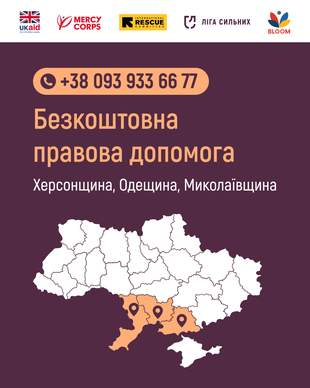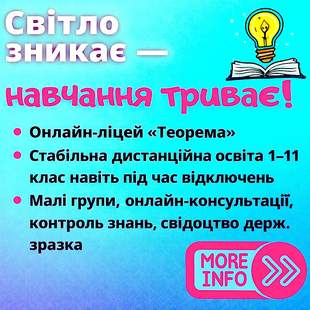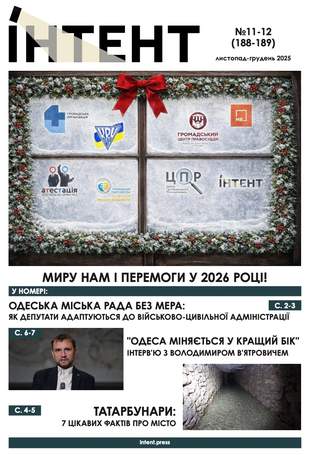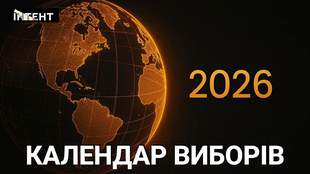Меню
Соціальні мережі
Розділи
Nov. 20, 2024, 10:01 p.m.
"We have been through too much together, me and the city," Kherson historian and writer Artem Petryk
This article also available in English229
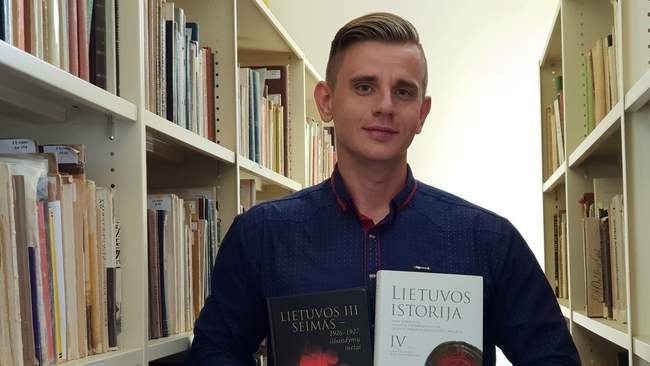
Artem Petryk. Photo provided by the source
Trials of occupation, dedication to the profession, and creativity for the benefit of Kherson residents. Artem Petryk, PhD in History, Senior Research Fellow at the Institute of History and Archeology of the Baltic Region, Klaipeda University, in an exclusive interview told Intent about this and the "Kherson phenomenon," Ukrainian-Lithuanian ties, and possible options for further developments in the Russian-Ukrainian war, taking into account historical experience. A descendant of the pragmatic people of the North, with the energy of the Ukrainian South, continued to work in occupied Kherson and has not left the city to this day.
Everyone has their own memories of the beginning of the full-scale invasion. What are yours?
It was not a shock, because the war was in the air. The enemy was not just amassing forces on the border. On the morning of February 24, I was woken up by explosions and the first thing I saw was a smoke stack from Chornobaiv airfield. And then everything was the same as for everyone else - the first basements, the first arrivals of Grad rockets.
The only thing is that, unlike most people, as a historian, I did not believe in the short duration of the war. In the last days before my departure from Lithuania to Ukraine, I spent my evenings wandering through my favorite streets of Vilnius, the Old Town. My heart was heavy, seemingly out of nothing. One day I went to the world-famous chapel, where the Aušros Vartai (Gate of the Dawn) is located. There was a group of tourists from Poland with a priest. The priest was talking about the fate of his fathers and grandfathers who had to survive the horrors of World War II, the terrible dawn of September 1, 1939. And I immediately thought, what if "the past never ends," and what if our generation is waiting for it, will we survive it? There were only a few months left before our "September 1, '39" - February 24, 2022...
It was not easy for representatives of your profession in the occupation reality, what difficulties did you face?
In reality, anyone whom the enemy could suspect of disloyalty and pro-Ukrainian views was at risk. Indeed, historians, like journalists, for example, could be of particular interest to the occupiers. In their picture of the world, there is no place for either unbiased scientific research by historians or the free press.
For the Moscow imperial machine, both are important parts of the great mechanism of state ideology and propaganda. The complexity of my personal situation was that I was and am an employee of a European academic institution, which means that I am a person directly connected to the Western world, which is hostile to the occupiers.
This, in fact, determined the threats that I or people like me faced under occupation. This led to such forced conspiratorial actions as frequent changes of location, changes in appearance, disassociation from social networks and potentially dangerous contacts, and so on. As time has shown, the approach I chose turned out to be the right one.
During the occupation, you continued to work, constantly documented events, and even managed to send your manuscripts to foreign colleagues. How did they react?
I had a need to take notes, driven by the intuitive professional sense of a scientist. We were at the epicenter of the creation of modern history and at the same time experiencing the greatest challenge to the existence of our nation in several generations. And writing allowed us to turn away from what was happening around us for a while. In the summer of 2022, I came up with the idea to systematize the records and transform them into literary forms.
That's how I created a series of short stories called Dreams of Kherson. I sent the manuscript to my colleagues in the fall. It was not clear then what would happen. Until the end of May, I was still using the Ukrainian mobile Internet. When the occupiers deprived us of this, we had only sporadic and sometimes random opportunities to connect to the network. On one of those days, I sent the piece.
In fact, they had been shocked by the events in Kherson since the video of the mutilated bodies of the fallen defenders killed by the occupiers on March 1 in the Lilac Park appeared online. Therefore, what I wrote easily fit into the canvas and corresponded to the ideas of my colleagues. Moreover, as historians, they were well aware of the nature of the Moscow Empire and its methods.
So what you documented formed the basis of your books. Which of the above evokes the most emotion in you? And what does the "Kherson phenomenon" mean?
It is widely believed that what I wrote about Kherson is exclusively autobiographical. This is not true. What I wrote concerns not only me, but also the stories of different people. Moreover, the actual slogan of the presentation campaign for the book "Dreams of Kherson" was "When the main character is the city." That's what it really says.
Each story resonates in my heart in its own way, some of them just trigger me, and many of them I don't even want to reread because of the imagery and realism of the description. I have no desire to return to 2022.
As for the "Kherson phenomenon," it is a multifaceted and complex phenomenon born of the biblical trials of war, captivity, all-consuming water, and the minute threat of death.
Kherson residents are a type of frontline person who finds joy in every ray of sunshine and is happy just to have the shelling stop and to have survived it. Years of living under fire do not prevent the citizens from getting married, having children, and smiling in the end. Kherson is a battered and exhausted city, but few people can believe in the best and be so firm in their faith and hope. It is also a city that is a bastion of Ukrainianness, tried and true.
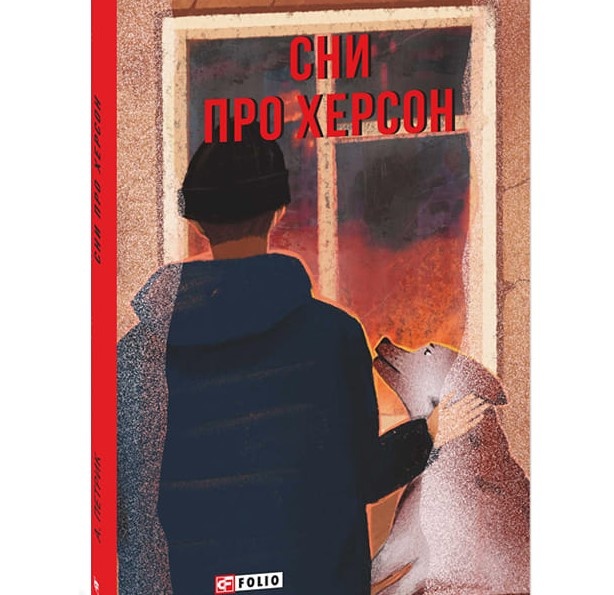
Photo by the interviewee
Based on the book Dreams of Kherson, Ukrainian director and actor Akhtem Seitablaev created the play Unanswered Letters. How did your paths cross and how did you come up with the idea?
We were introduced by the chaplain Serhiy Dmitriev, the same one who is widely known as "Padre" and the head of Eleos-Ukraine. The birth of the performance is the result of a combination of Father Serhiy's enthusiasm, playwright Akhtem's talent, and my creativity. And also, of course, the support of the then Ambassador Extraordinary and Plenipotentiary of the Republic of Lithuania to Ukraine, Valdemaras Sarapinas.
The Ukrainian struggle and the fate of Kherson are very close to him. Thus, the Lithuanian Embassy became the venue for the pilot performance of Unanswered Letters. Then, in June 2023, we sought to draw the attention of the diplomatic establishment to the fate of Kherson, the tragedy of an individual against the backdrop of the largest war in Europe since 1945. Obviously, we succeeded.
It is interesting and telling that the idea of the play was first discussed with Mr. Padre and I during an audience when we solemnly handed over to the Republic of Lithuania the flag and coat of arms that I managed to preserve while hiding during the occupation of Kherson.
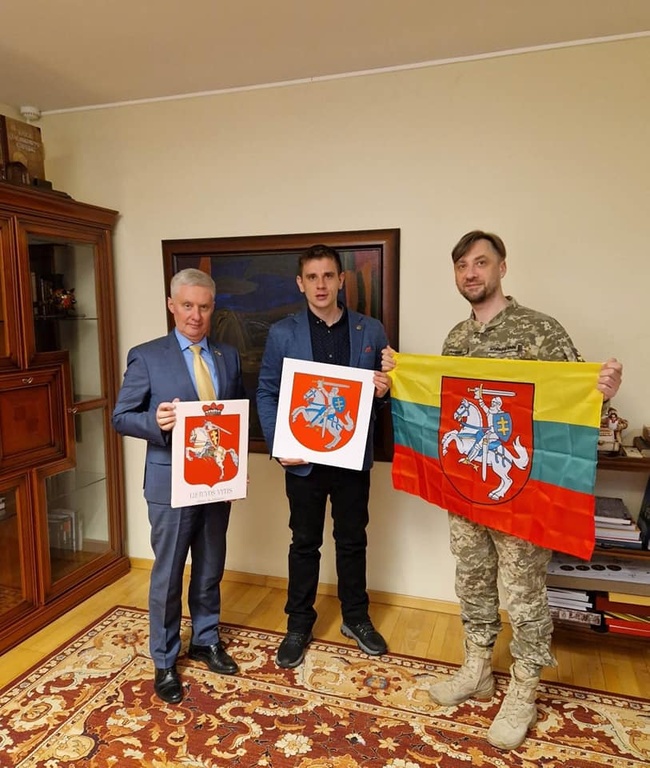
Photo provided by the interviewee
How do you remember the day of the liberation of Kherson and how did you decide to act when you could finally breathe freely?
The Ukrainian Armed Forces were approaching. We were waiting, but we had no idea what the fate of the city was, we were anticipating street battles and total destruction. And then the Russians destroyed the infrastructure, the city was without water, electricity, and communication. We cooked on fires, collected rainwater and firewood for fires. But we believed in liberation.
The very day of November 11 was a blur for me, I wanted to accept that we were finally free, but I was afraid of enemy provocation. It was hard to believe that the occupiers had left without a fight.
The realization came the next morning when I saw several men fighting for the right to tear down Russian propaganda on a billboard. I felt happy, but immediately felt very tired from months of continuous stress.
For two years now, Kherson has been under regular shelling from various types of cannon and rocket artillery, air strikes have become more frequent, and in recent months drones have been particularly annoying. Civilians and vehicles are attacked, parks and streets are mined. In short, the struggle continues. As for my plans... My plans were simple: to live to see Ukraine's victory and return to writing.
Your books not only reveal the truth, but also help to do good deeds. After all, you used the proceeds from one of them to help the people of Kherson and animals affected by the war.
It was an initiative of Folio Publishing House. Almost simultaneously with the publication of the book His Name is Padre, the occupiers blew up the Kakhovka hydroelectric power plant. The Kherson region and the city of Kherson found themselves in an environmental disaster zone. At the same time, the enemy continued active shelling of the regional center and other settlements.
Naturally, a keen desire to support the victims guided the creation of initiatives and their implementation. I will only say that we, together with Eleos-Ukraine (the social ministry of the Orthodox Church of Ukraine) and its head, the prototype of the protagonist of the second book, have been helping war victims and families of servicemen for a long time, even before the full-scale war.
In 2019-2022, about a hundred Ukrainians were given the opportunity to study at Klaipeda University for free. Gifted young people from families in difficult life circumstances received support from representatives of Lithuanian business and the city of Klaipeda. We also helped families of military personnel.
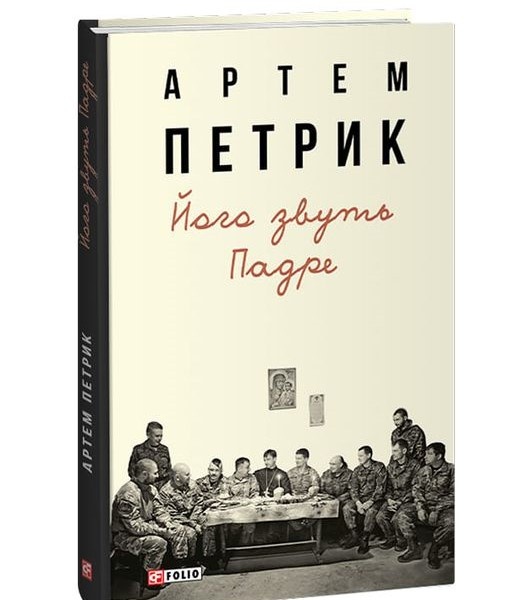
Photo provided by the interviewee
Was it for your literary and humanitarian work that you were awarded this year?
If you mean the Medal of the Archangel Michael, then yes. Not only me, but also the rector of Klaipeda University, Arturas Razbadauskas, was awarded. Without his support, it would have been impossible to realize our plans and implement large-scale humanitarian initiatives. In fact, in my case, the award was for the background in the complex. It was for my scientific work, organization of the first Lithuanian History Research Center in Ukraine, strengthening of Ukrainian-Lithuanian communications, literary activity, and assistance to families in need of special care.
You announced your marriage on social media. It is symbolic that it was in your free hometown. How did it go? After all, the city is under fire.
Oh, yes. It was an interesting day and a real Kherson wedding in the realities of the time. Ukrainian-Lithuanian style. We were driven to the registry office in a car smashed by shrapnel, with the broken rear window covered with plastic wrap and tape. The registry office itself is in the "red zone" near the Dnipro River, and the enemy is across the river. Smashed walls, sandbags, the sound of explosions and smiling faces of employees.
People are positive, despite everything. They apologized that we would not be taken to the ceremonial hall because there was a flight. And now - the whistling of mines, 14 arrivals nearby, a photo shoot against the backdrop of the war's aftermath. A movie, in fact, an unforgettable moment of life.
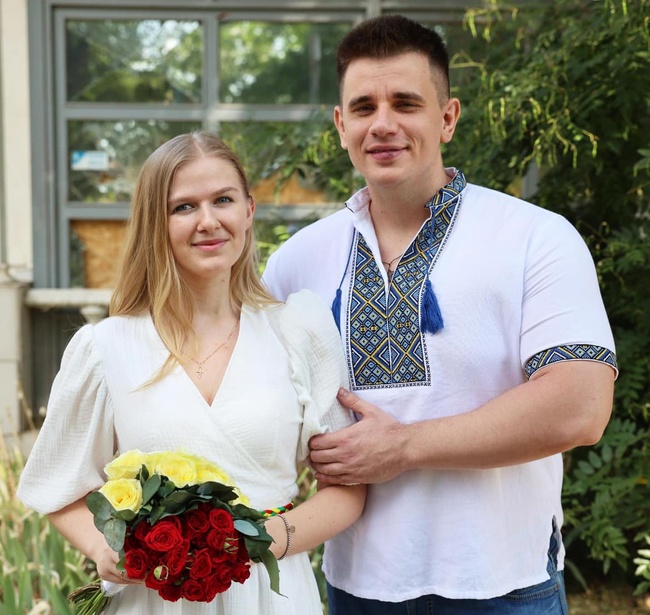
With his wife Lesia. Photo provided by the interviewee
Do you plan to live in Kherson?
I would like to continue working on the little-researched problems in Ukrainian historical lithic studies. We need to continue to popularize the history of Ukraine in Lithuania and Lithuanian history in Ukraine. In this vein, I am planning various formats. It's too early to announce them yet, but we'll see what happens.
I also have thoughts about fiction or journalism. Perhaps these will be works that will open up the life of the pre-war South, the land of our childhood and youth, to the reader. Answering the question of whether I will live in Kherson, I will say that Kherson, whether I want it or not, will always be a part of me, no matter where I am, no matter how pretentious it may sound. We've been through too much together, me and the city.
You specialize in the study of Lithuanian history and its connections with Ukrainian history. How do you see these ties now?
Very broad and strong. Lithuania is one of Ukraine's most loyal, firm and consistent allies. Not only since the full-scale invasion, but since 2014. Lithuania has also been our long-term advocate in European and Euro-Atlantic structures. It is an ardent supporter of Ukraine's integration into them. The reasons for this attitude lie in both historical tradition and pragmatism, which is normal for any state that defends its own interests.
As for the tradition of positive attitudes toward Ukraine in Lithuania, the roots lie in the common experience of building state projects in the past, such as the Grand Duchy of Lithuania and the Polish-Lithuanian Commonwealth. Contacts between the Ukrainian and Lithuanian national movements in the first quarter of the twentieth century were close and intense. Both peoples went through the trials of the war for independence at the turn of 1910-1920 and in the interwar period of 1920-1930.
When Ukraine and Lithuania again found themselves in an identical situation during World War II, liberation struggles against the same occupiers unfolded in both countries. The same tragic ending to the struggle for freedom, communist repression against resistance fighters and their families, and mass terror against the Ukrainian and Lithuanian populations by the Soviet authorities. The trouble brought us closer and even united us. The suffering of the deportees, the camps in Siberia where Ukrainians and Lithuanians shared a piece of bread. Our conversation is not enough time to talk about all the episodes of unity.
As for the pragmatic component, a democratic, European Lithuania is interested in a stable Baltic-Black Sea space and in repelling a new and renewed offensive of imperialism from the East, which poses a direct threat to all free peoples of the region.
The stability of a strong pro-Western Ukraine is a guarantee of preserving freedom and civilizational priorities and values for its neighboring countries.
Analyzing today's events, taking into account historical experience, what are your thoughts on the further development of events and the consequences that we should expect?
Much will depend on how the geopolitical situation and the internal situation in our country develop. However, I am sure that our main task now is to preserve the Ukrainian state as such. Maintaining a strong army and Ukraine's subjectivity in the international arena. This will be a great victory and a guarantee of our existence in the future.
Further, the situation can change dramatically, including in the state of our enemy. The aggressive and crazy "tsar" may well be replaced by a weak figure. The aggressor country has many internal problems, it is sewn together from numerous national entities, like an old and faded sheet of multi-colored patches held together by fear and the iron hand of the center. This empire has already collapsed twice - in 1917 and 1991.
So, let's just say that anything can happen, so to speak, the "tradition" has already been established. And the question for us is whether we will be ready as a society and a military and political machine if this happens. And what will be done to bring such a moment closer. Will there be effective work done on the mistakes of previous years?
The work on this material was made possible by the Fight for Facts project, which is implemented with the financial support of the German Federal Ministry for Economic Cooperation and Development.
Анна Шаповал
